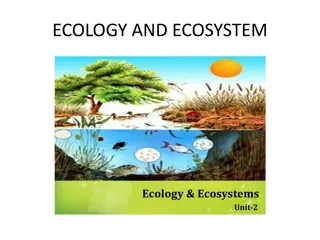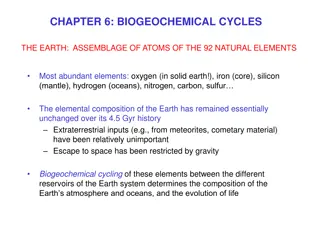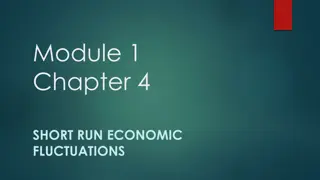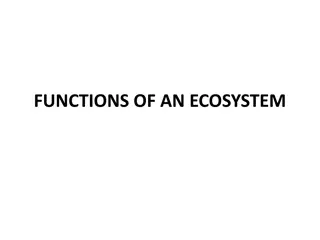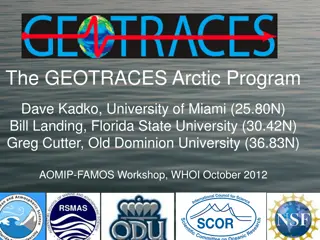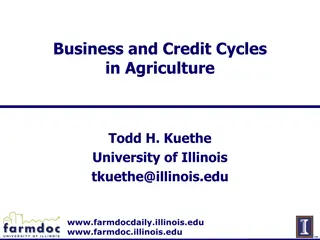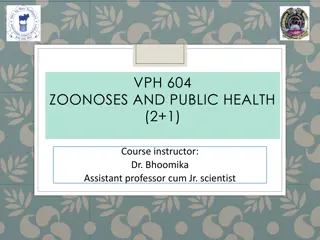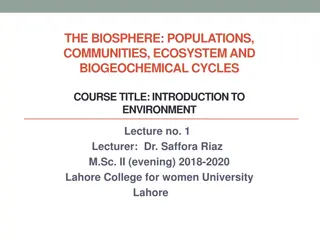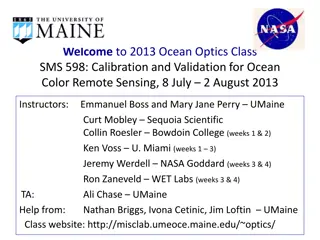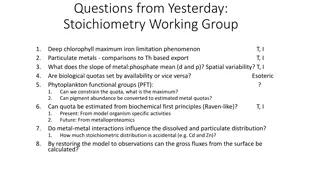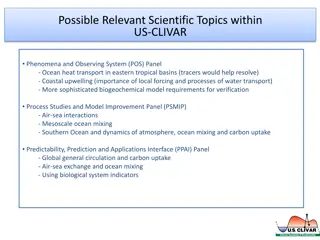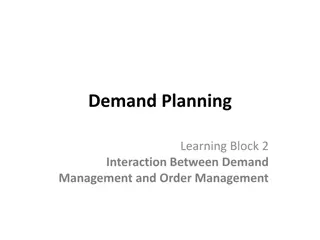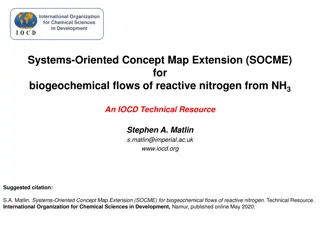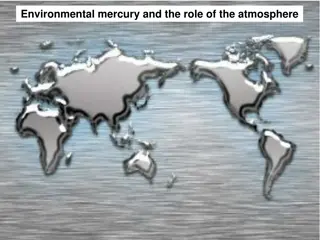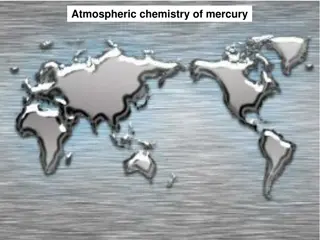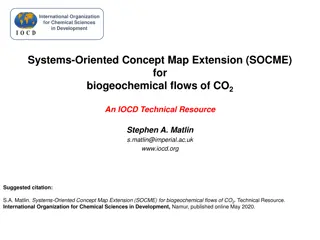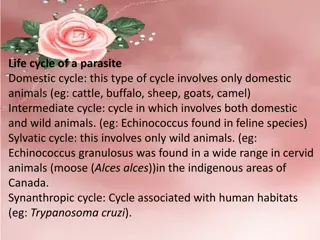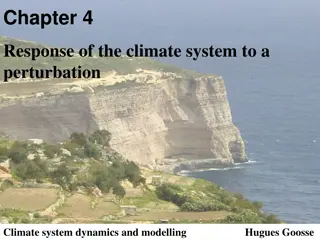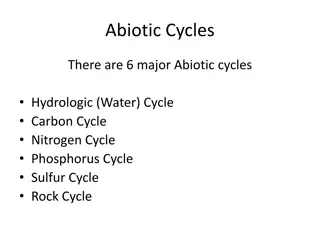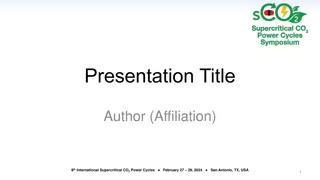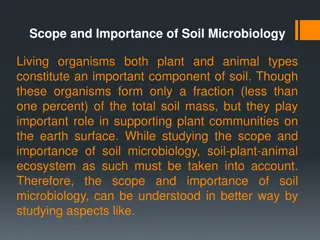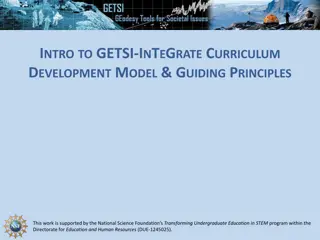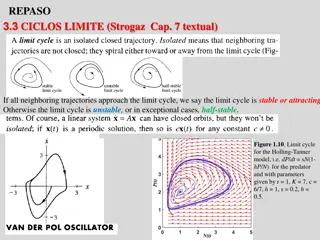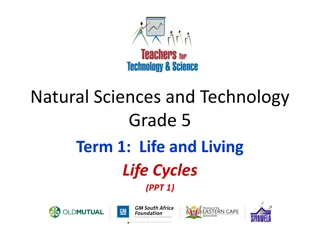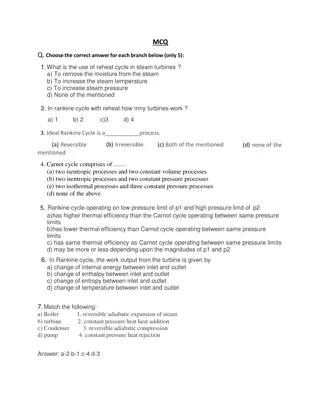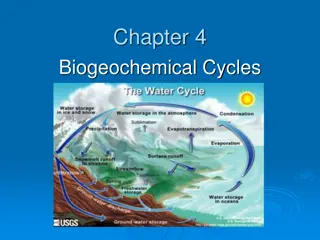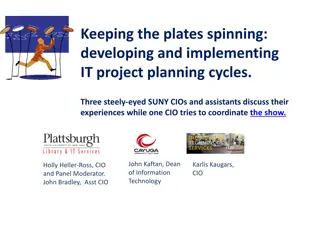Relevance of Countercyclical Fiscal Policy and Fiscal Acyclicality
This literature review examines the effectiveness of countercyclical fiscal policies in stabilizing output and enhancing welfare, with a focus on the correlation between public spending cycles and GDP cycles. The study analyzes examples from Sweden and Argentina to showcase the impact of fiscal poli
4 views • 29 slides
Ecology and Ecosystem: A Comprehensive Overview
Ecology, derived from the Greek word "oikologie," explores the interactions between organisms and their environment. The study encompasses various branches like human ecology, population ecology, and habitat ecology, focusing on the relationships within ecosystems. An ecosystem, defined by A.G. Tans
1 views • 68 slides
Insights into Biogeochemical Cycles and Evolutionary History of Earth
The Earth's elemental composition has remained constant over its 4.5 billion-year history, with biogeochemical cycles playing a vital role in shaping the atmosphere and oceans. The evolution of oxygen, ozone, and life on Earth is intricately linked to these cycles. Contrasting Earth and Venus, it's
0 views • 15 slides
Contrasting E-Government and General Project Life Cycles
E-Government project life cycles differ significantly from general project life cycles, with the former's focus on management and stakeholder needs, leading to challenges in requirements gathering and adapting to changing priorities. The Waterfall model used in general projects may result in project
0 views • 9 slides
Trade Cycles: Economic Fluctuations and Phases
Trade cycles, also known as business cycles, are fluctuations in economic activities, affecting employment, output, income, prices, and profits. These cycles consist of phases including depression, recovery, prosperity, and recession. During booms, economic activities peak, while recessions see a sl
7 views • 7 slides
The Key Functions of an Ecosystem
Ecosystem functions are vital for the survival of various components within them, with energy flow, nutrient circulation, and biogeochemical cycles playing significant roles. Energy flow starts with solar radiation and sustains producers, consumers, and decomposers, highlighting the interconnectedne
0 views • 21 slides
The GEOTRACES Arctic Program and Its Scientific Objectives
The GEOTRACES Arctic Program aims to study marine biogeochemical cycles in the Arctic region, focusing on trace elements and isotopes. Through international collaboration, the program identifies processes affecting the distribution of key elements in the ocean. The unique Arctic environment, vulnera
0 views • 23 slides
Pseudo-Goodwin Cycles in a Minsky Model
This paper delves into the dynamics of Pseudo-Goodwin cycles within a Minsky model, examining the counter-clockwise movement of output and wage share. It distinguishes between true Goodwin cycles and pseudo variants, highlighting the role of income distribution, debt, and demand in shaping economic
0 views • 27 slides
Business and Credit Cycles in Agriculture
This research delves into the relationship between business and credit cycles in agriculture, focusing on the impact on operating margins, farmland prices, and lending practices. It explores the linkage between asset values and credit, highlighting the significance of farmland as collateral in farm
1 views • 23 slides
Zoonoses in Public Health: Classification and Transmission Cycles
Zoonoses, diseases transmitted from animals to humans, are classified based on etiological agents, transmission cycles, and reservoir hosts. The classification includes bacterial, viral, rickettsial, chlamydial, mycotic, and parasitic zoonoses. Transmission cycles are categorized as direct, cyclozoo
0 views • 19 slides
Exploring the World of E-Cycles: Innovation, History, and Legal Aspects
Delve into the realm of E-Cycles through an informative journey covering the North East Electric Conclave, advancements in e-mobility, and the legal framework for E-Cycles in India. Uncover the fascinating history of E-Cycles, from their inception in the 1890s to their modern-day classifications and
3 views • 23 slides
Stochastic Coastal Regional Uncertainty Modelling II (SCRUM2) Overview
SCRUM2 project aims to enhance CMEMS through regional/coastal ocean-biogeochemical uncertainty modelling, ensemble consistency verification, probabilistic forecasting, and data assimilation. The research team plans to contribute significant advancements in ensemble techniques and reliability assessm
0 views • 28 slides
The Earth's Environmental Systems and Cycles
Explore the interconnected systems of the Earth's biosphere, lithosphere, hydrosphere, and atmosphere, along with biogeochemical cycles like the hydrological cycle. Learn how these systems interact to sustain life and maintain Earth's dynamic environment over billions of years.
1 views • 28 slides
Ocean Optics Class 2013: Calibration & Validation for Remote Sensing
This class in 2013 focused on calibration and validation for ocean color remote sensing, featuring instructors like Emmanuel Boss and Mary Jane Perry. From historical insights to the key to the class's success, the curriculum provided a learning community emphasizing hands-on experience, critical an
0 views • 9 slides
Insights on Biogeochemical Processes and Metal Interactions in Marine Environments
Delve into the intricate relationships between metals, stoichiometry, and biological quotas in marine ecosystems. Explore the impact of metal interactions on biogeochemical provinces, resource supply stoichiometry, and the constraints they impose on marine biota. Uncover how deep chlorophyll maxima,
0 views • 5 slides
Advanced Biomarker Analysis in Biogeochemistry Studies
In biogeochemistry research, advanced analytical techniques are utilized to isolate and separate organic matter, focusing on major carbon pools in bodies of water like Lake Superior. Biomarkers such as fatty acids and specific compounds are identified as indicators for various microbial processes, i
0 views • 11 slides
Advancing Climate Research: Topics and Challenges in Ocean Observations and Modeling
Exploring topics like ocean heat transport, coastal upwelling, biogeochemical model requirements, and air-sea interactions within the US-CLIVAR panels. Additionally, understanding the importance of global observation capabilities in constraining climate sensitivity and enhancing modeling efficiency
0 views • 8 slides
Demand Planning and Order Management: Enhancing Efficiency
Explore the intricate relationship between demand planning and order management, crucial for optimizing customer order fulfillment cycles. Learn key principles, tools, and techniques to enhance communication and manage demand effectively, along with contemporary approaches and e-commerce fulfillment
1 views • 28 slides
Systems-Oriented Concept Map Extension for Reactive Nitrogen Flows
International Organization for Chemical Sciences in Development presents a Systems-Oriented Concept Map Extension (SOCME) focusing on biogeochemical flows of reactive nitrogen from NH3. The concept explores core reaction subsystems, energy input subsystems, equilibrium conditions, and the integratio
0 views • 11 slides
Mercury: Environmental Impact and Atmospheric Role
Mercury, a global environmental concern, is sourced from fish consumption and industrial activities. Its electronic structure and biogeochemical cycle contribute to its volatility and toxicity. Global transport through the atmosphere plays a significant role in its distribution and deposition, impac
0 views • 7 slides
Mercury: Environmental Impact and Human Health
Mercury, a potent environmental pollutant, poses significant risks to human health. This overview explores the origins of mercury poisoning throughout history, including notable incidents such as the Minamata disaster and modern-day cases like Jeremy Piven's and Richard Gelfond's struggles with merc
0 views • 16 slides
Plant Reproduction and Life Cycles in Biology II for Non-Majors
Explore the complex processes of plant reproduction, life cycles, and the alternation of generations in biology. From the fusion of male and female gametes to the development of sporophytes and gametophytes, delve into the stages and structures involved in the reproduction of gymnosperms and angiosp
0 views • 25 slides
Systems-Oriented Concept Map Extension for Biogeochemical Flows of CO2
The Systems-Oriented Concept Map Extension (SOCME) explores the biogeochemical flows of CO2, detailing interactions within the ocean and land subsystems, including factors such as uptake by different biomes, anthropogenic CO2 generation, deforestation effects, and energy production contributions. It
0 views • 6 slides
The Complexities of Parasite Life Cycles and Host Interactions
Parasites exhibit diverse life cycles and behaviors, with cycles ranging from domestic to sylvatic environments. Factors influencing parasite diseases include host specificity, immunity, and host-parasite interactions. Parasitism can alter host behavior, impacting ecological dynamics. Immunology pla
0 views • 9 slides
Isotopes in Biogeochemistry
Isotopes are atoms with the same number of protons but different numbers of neutrons. This presentation explores the significance of stable isotopes, types of isotopes, expressing isotopic abundances, isotope effects, and applications to geochemical studies. Learn about common light element stable i
0 views • 14 slides
Processor Cycles and Machine Cycles in 8085 Microprocessor
Processor cycles in microprocessors like 8085 involve executing instructions through machine cycles that are essential operations performed by the processor. In the 8085 microprocessor, there are seven basic machine cycles, each serving a specific purpose such as fetching opcodes, reading from memor
0 views • 17 slides
Climate System Response to Perturbations: Insights from Hugues Goosse's Chapter 4
Hugues Goosse's Chapter 4 delves into the response of the climate system to perturbations, emphasizing radiative forcing, greenhouse gases, aerosols, and their impacts on Earth's radiative budget. The chapter intricately describes physical feedbacks, interactions involving energy balance, hydrologic
0 views • 40 slides
Abiotic Cycles in Ecosystems: Hydrologic, Carbon, Nitrogen, and More
Abiotic cycles play a crucial role in regulating ecosystems. The hydrologic cycle involves processes like evaporation, condensation, precipitation, and transpiration. The carbon cycle relies on photosynthesis, respiration, and human activities like deforestation and burning fossil fuels. The nitroge
0 views • 20 slides
Redox Conditions and pH Control in a Mountain Watershed: Study in Red Canyon, Wyoming, USA
Exploring redox conditions and trace element concentrations in a semi-arid mountain watershed, this study in Red Canyon, Wyoming, delves into the impact of oxic surface water and anoxic groundwater on trace element cycling. The investigation aims to enhance understanding of seasonal variabilities, f
0 views • 11 slides
8th International Supercritical CO2 Power Cycles Conference in San Antonio, TX, USA
The 8th International Supercritical CO2 Power Cycles Conference is scheduled from February 27-29, 2024, in San Antonio, Texas, USA. This conference aims to bring together experts in the field to discuss the latest advancements and research in supercritical CO2 power cycles. The event will feature pr
0 views • 9 slides
SMC Alliance Annual Meeting: Defeating Malaria Together - Overview and Planning for 2022
The SMC Alliance Annual Meeting discussed the methodology for data collection and analysis, past SMC campaign data, coverage and trends in average number of children covered since 2014. It highlighted countries performing 5 cycles, those with incomplete 4th cycles, and those focusing on 3 cycles. Th
0 views • 8 slides
Scope and Importance of Soil Microbiology in Ecosystems
Soil microbiology plays a significant role in supporting plant communities and maintaining soil health. Living organisms, both plant and animal types, form only a small fraction of soil mass but are crucial for processes like plant growth, organic matter decomposition, humus formation, and biogeoche
0 views • 14 slides
Enhancing Geoscience Literacy and Workforce Preparedness through InTeGrate Curriculum Development
A comprehensive initiative supported by National Science Foundation aimed at improving geoscience literacy, integrating societal issues into undergraduate curriculum, and fostering interdisciplinary teaching. Through collaborative efforts and explicit focus on transformation of higher education, InT
0 views • 27 slides
Limit Cycles and Bifurcations in Dynamical Systems
Explore the stability of limit cycles and bifurcations in dynamical systems through examples like the Holling-Tanner model. Discover the significance of stable limit cycles and the role of Liapunov functions in forbidding closed orbits. Delve into the intriguing behavior of trajectories in bottlenec
0 views • 16 slides
Life Cycles: Plants and Animals
Explore the fascinating world of life cycles in plants and animals through engaging visuals and descriptions. From the process of germination to the different stages of growth and development, discover how living organisms move through their life cycles. Topics include plant pollination, seed disper
0 views • 14 slides
Engineering Thermodynamics Multiple Choice Questions
This content covers various topics related to engineering thermodynamics through multiple-choice questions. It includes concepts such as the use of reheat cycles in steam turbines, ideal Rankine cycles, Carnot cycles, and the efficiency of different cycles. Questions on the Rankine cycle, working fl
0 views • 4 slides
Animal Life Cycles Review and Group Challenge
Explore the world of animal life cycles through a trivia game and group challenge. Test your knowledge on organisms, embryos, vertebrates, invertebrates, and more. Dive into rounds of tricky taboo questions and identify adult animals from their offspring. Discover common traits among mammals, unders
0 views • 8 slides
Biogeochemical Cycles and Their Impact on Earth's Ecosystems
Biogeochemical cycles involve the cycling of essential nutrients like water, carbon, oxygen, nitrogen, phosphorus, and sulfur through abiotic components like water, air, soil, and rock to biotic components like plants, animals, fungi, and bacteria. Humans play a significant role in these cycles, imp
0 views • 24 slides
Thermodynamic Calculators for Comprehensive Analysis of Systems, Processes, and Cycles
Explore a series of simplification in the TESTcalc Tree, leading to the accurate analysis tool system states and basic tools for uniform and non-uniform systems. Access TESTapps for a variety of thermodynamic calculators catering to specific, generic, mixing, non-mixing, and combustion systems, alon
0 views • 12 slides
Keeping the Plates Spinning: Insights from SUNY CIOs on IT Project Planning Cycles
Three SUNY CIOs and their assistants share experiences on IT project planning cycles, emphasizing the crucial role of planning for success. Lack of planning can lead to chaos and inefficiencies. The discussion highlights the need for strategic IT enablement in the academic enterprise and the importa
0 views • 35 slides

